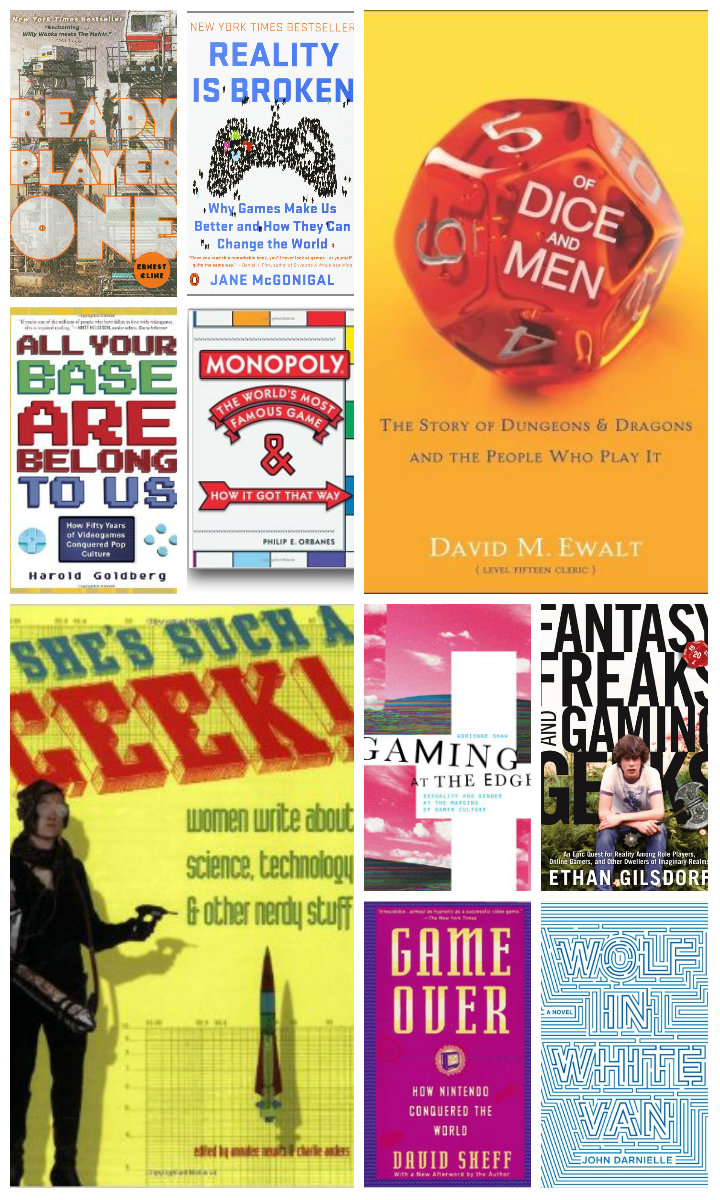I’ve always loved games---and they’ve always been a big part of my life. I have an uncle who custom-coded a Clue game for my DOS-run computer; I remember being too small to count and “helping” my mother play Rook; despite being born well after most of the events in it occurred, I’ve played the Baby Boomer Trivial Pursuit so often that I’ve almost memorized the answers.
And so I suppose it’s not that much of a surprise that I want to read some gaming-minded books, to learn both about the history of games and to consider their future. And when Lyn asked me to guest post here, I thought this would be the perfect spot for that TBR list.
Ready Player One: A Novel, Ernest Cline (2012). It’s 2044, and reality sucks. But the internet has gotten even better: it’s an interactive, multi-verse called OASIS. Wade Watts, like many others, spends most of his time there. But OASIS is actually dangerous. And Cline’s writing is both witty and laugh out loud funny, full of insight and 1980s pop culture references (is there really any difference?).
Reality is Broken Why Games Make Us Better and How They Can Change the World, Jane McGonigal (2011). McGonigal is a game designer and researcher; in this book she discusses real-world applications of gaming. Her underlying thesis isn’t far-fetched: we’ve long accepted not just that there are real-world improvements from playing games that include hand-eye coordination and improved decision-making skills but also that games have cultural value as well.
All Your Base Are Belong to Us: How Fifty Years of Video Games Conquered Pop Culture, Harold Goldberg (2011). Goldberg has been writing about video games for years as a columnist. Now, Goldberg has put together a text that spans video game history---and if the history of video gaming is found lacking in length, it makes up for that in its breadth. Goldberg uses key figures and key games to tell the history of gaming—Ralph Baer and Hiroshi Yamauchi, Donkey Kong and Grand Theft Auto.
Monopoly: The World’s Most Famous Game—And How it Got That Way, Philip E. Orbanes (2007). I’ve never been a huge Monopoly fan, but every now and again, I do enjoy a good game that’ll destroy the family peace for a night or two, and Monopoly it is. Anyway, I’m fascinated by the game, by its place in Americana, and this book takes us from the origins of the game as a teaching tool in college classrooms to its current incarnation.
Of Dice and Men: The Story of Dungeons and Dragons and The People Who Play It, David M. Ewalt (2014). I tried playing D&D exactly twice. A very dear friend wrote me an amazing character--a roguish wood elf who rode a night mare—and during her glorious two-night run in the game, she managed, among other things, to conjure a 20 foot chicken. This book seems like both an explanation and a celebration of the game, and I admire that.
She’s Such a Geek: Women Write about Science, Technology, and Other Nerdy Stuff, edited by Annalee Newitz and Charlie Anders (2006). While not only about gaming, this anthology has plenty of gaming-related material in it, from D&D to game coding. The essays are about (and by!) women who’ve excelled in male-dominated fields, and they explore the feminine side of being geeky.
Gaming at the Edge: Sexuality and Gender at the Margins of Gamer Culture, Adrienne Shaw (2015). Shaw discusses representation in video games as vital by exploring those gamers on the outside of a media landscape that is dominated by the young, white, hetero male. She uses postcolonial, queer, and feminist theories to discuss how and why these representations in video games matter.
Fantasy Freaks and Gaming Geeks: An Epic Quest for Reality Among Role Players, Online Gamers, and Other Dwellers of Imaginary Realms, Ethan Gilsdorf (2010). This is the story of a gamer who grew up. He put away his geekdom, or tried to, and then, around 40, he starts to reconnect with that history, with that past. This one draws divisive reviews sometimes, but I think that’s part of what interests me about it.
Game Over: How Nintendo Conquered the World, David Sheff (1994). This is by far the earliest entry on the list, and it’s a testament to just how quickly and how completely Nintendo dominated the market. Sheff explores the history of the company, and this seems to be a go-to gaming history text amongst gamers.
Wolf in White Van, John Darnielle (2014). And one more fiction, just to bookend the list. Darnielle’s novel tells the story of Sean Phillips, who has been in isolation since he was a teenager. Sean is a world-builder, the creator of a through-the-mail RPG called Trace Italian. The story is told in reverse, moving backward through time in mimicry of events in the story. This is one I very much look forward to reading.
Diana is the mastermind behind Part Time Monster (where I do a monthly contributor's post). She's a smart, funny lady who just so happens to be my friend/sister-in-law! You can check out more monstery goodness here.

